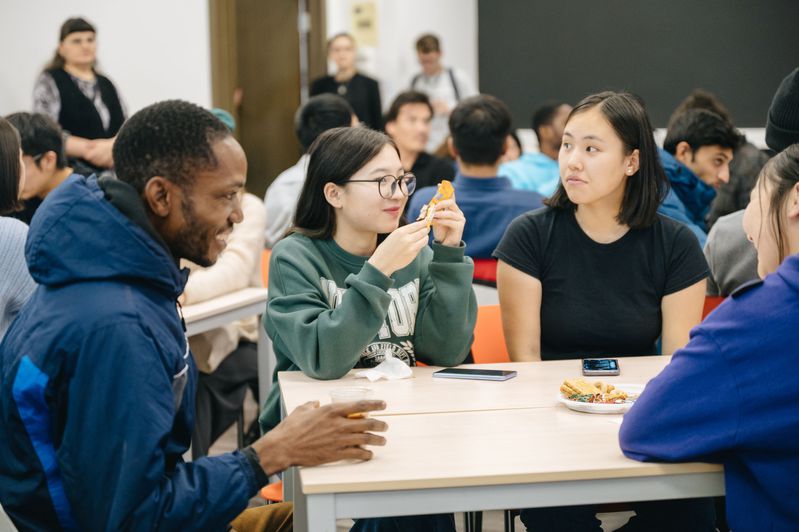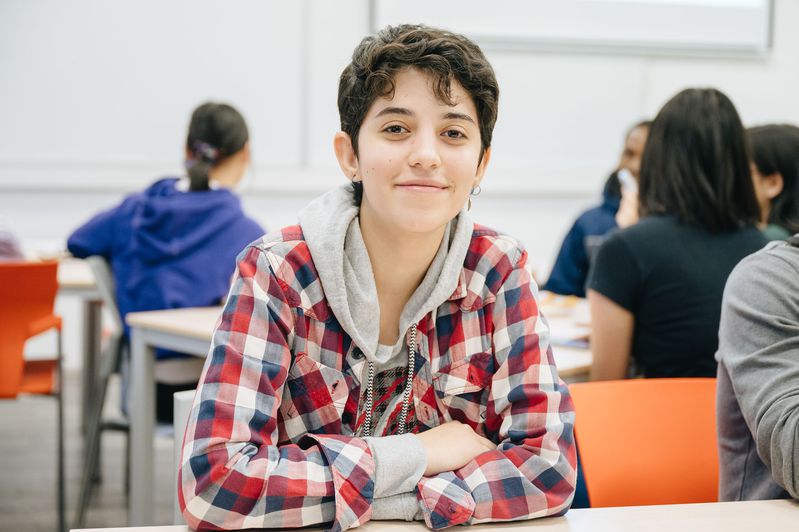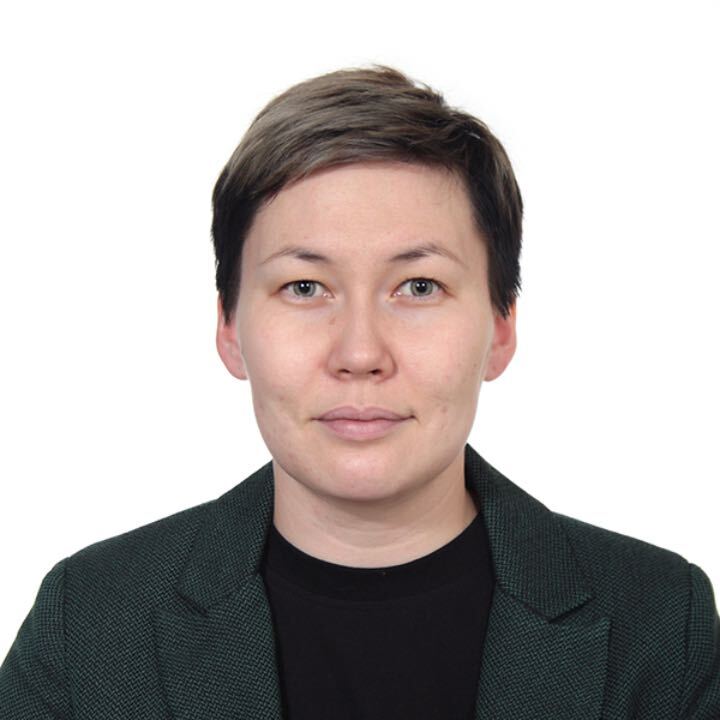Russian Speaking Club: Practicing the Language and Meeting New Friends

For HSE Preparatory Year students, the Russian Speaking Club is a way to improve their language proficiency in a relaxed atmosphere. At this year’s first such event, they discussed online communications and social media. Michael Dzodzoe from Ghana and Leen Sabbagh from Syria shared their impressions with the HSE News Service.
The HSE Prep Year organises Speaking Clubs at the end of each month throughout the academic year. The meetings are open to students with a Russian proficiency of A2 level and higher.
The first meeting of the club was open to everyone. Its special goal was to welcome the newly admitted HSE Preparatory year students, so that they could meet other students and teachers. Overall, 188 students from 47 countries have already arrived to study in the preparatory course.
The participants were divided into groups of five to seven people. With tea, coffee, and snacks available at each table, the setting invited a relaxed discussion. The first prompt was ‘introductions’—students said their names and home countries, then shared what social media apps are used in their respective countries and which emojis are the most popular. The next topic for discussion was ‘the advantages and disadvantages of social media’. The students agreed that some advantages may also be disadvantages at the same time, such as the abundance of information of all sorts.
Further topics required the students to do a spot of thinking. Using a list of someone’s subscriptions, they speculated who that person might be: their gender, profession, and interests. Everyone eagerly engaged in games to guess a film or country by three emojis. At the end of the event, the students were given some gifts from HSE University and exchanged their social media accounts.
The next big Speaking Club event will be held before the New Year holiday. Over 50 participants are expected to attend.
Michael Dzodzoe, 38, Ghana

I got my bachelor’s degree in graphic design 14 years ago from Kwame Nkrumah University of Science and Technology (KNUST). I applied to HSE University, choosing a Russian-taught master’s programme in graphic design.
My first impressions of Moscow are that the metro system is very complex and advanced. Since I’m a designer, I like the way the transportation system is structured; it complies with very high standards. Generally, I like HSE University a lot.
I like the way Russian people are always on time, and the system works well
I came to Russia two weeks ago and started studying on the HSE Preparatory Year programme right away. I like my teacher at HSE University and the way she teaches the language. I love Russian language and would like to speak like a native Russian. I think it is an easy language and I don’t have any problems with it. I think that a great way to learn a language is to learn songs and rhymes, because this way you memorise words and phrases. I learned the song Blue Railway Wagon [from the Soviet cartoon Cheburashka] on my own.
I enjoyed today’s speaking club a lot. It’s an informal way of getting to know everybody and interacting with each other
I now know other language learners on the HSE Prep Year. I believe it’s very useful for language studies and I’ll certainly be attending such events in the future.
Leen Sabbagh, 20, Syria

I am from Damascus, Syria. I graduated from high school with a specialisation in science last year. I’ve actually already applied for a bachelor’s programme in psychology at HSE University for the next academic year. Some of the classes on this programme are in Russian, and some are in English.
HSE University encouraged me to come to Russia. A friend of a friend is studying at HSE and I learned from her that it is one of the greatest universities in Russia. I started looking at the HSE website and social media and I was impressed. I want to study at a very good university, especially in the field of psychology. I applied for a Russian government scholarship to study at HSE.
I hadn’t learned Russian in Syria before coming to Moscow, and I came here only three weeks ago. During the first module of the Preparatory Year, we have very intensive Russian classes almost every day except Sunday—15 classes a week.
At first, I thought this was too much. I arrived, and the classes started immediately the next day. But after a few weeks, I am thankful
It was hard not knowing Russian in Russia. Three weeks were enough for me to start understanding some words and speaking some sentences.
For me, practicing Russian is still the hardest part of learning. Russian words are long and not familiar to the ear of foreigners. When you hear it for the first time, you do not know what it means. You can memorise the shape of the word, but saying it is the hardest part for me.
Honestly, at first, I did not want to be here today. I had some social anxiety, since my Russian is not that good and I thought a Russian speaking club might not be the best idea.
I have a great teacher, Anastasia. She encouraged us to come here, and I am really thankful she did. I really had fun today
I am definitely going to attend more Speaking Club events, especially when my Russian gets better. I am going to be here every time.

Our Speaking Club is not a language lesson. We don’t correct errors or drill rules or collocations here—those things are done in classes. Here, our main goal is to let students speak in an informal atmosphere. Everyone has an opportunity to have their say, no matter their level of proficiency, and listen to others, including those who are better at it. The only limitation we have is the topic of the event: we try to stick to the chosen topic during the discussion. Today, we have chosen the topic of social media. We did it on purpose, so that the students have a chance to find each other on social media and become friends.
We have a lot of plans for the academic year. In November, we are organising a club on body language in Russia and other countries—we’ll discuss similarities and differences. In January, Russia celebrates Students’ Day, so we’ll talk about student traditions. In February, when our students will start their courses in history and social science, we’ll discuss the topic ‘Alternative History: What, if…?’ In March, we’ll talk about friendship. In April, when Cosmonautics Day in Russia commemorates Yury Gagarin’s first spaceflight, we’ll talk about space. And in May, before the summer break, we’ll share our thoughts about travel.
See also:
‘Put in the Effort, and You Will Learn a Lot’
Roosevelt Ogah is a first-year student of the master’s programme in Economics and Economic Policy at HSE University. He studies on the research track ‘Microeconomics and Macroeconomics’ and demonstrates very high academic performance. In his interview, he shares his experience of studying abroad for the first time and some tips on how to achieve high results in studies.
‘The Process was Challenging, yet Well-Organised’
Samuel Okai, 28, from Ghana, is a master's student of Strategic Corporate Finance in his final year at the HSE Faculty of Economic Sciences, majoring in assets pricing. In this interview, he shares his admissions experience and speaks about learning at HSE University, while offering some tips for those ready to succeed in their studies.
‘Everyone Quickly Engaged in Conversations and Demonstrated Their Creative Thinking’
The online Russian Speaking Club opened only a month ago, but has seen a rapid growth in the number of participants. Every week, the club holds free online meetings where participants and a Russian language tutor discuss various topics related to the Russian language and culture. Below, the club leaders share their impressions and plans, which include going offline.
‘Oh My, I’m Doing It Exactly that Way’: Non-Verbal Communication Mistakes and How to Avoid Them
On November 24, a unique event for HSE international students—a practice-oriented training session on ‘How to Make a Good Impression in an Interview: Non-Verbal Communication’—took place at HSE University. Natalia Trubnikova, author of the training, covered the basics of nonverbal communication and body language; non-verbal mistakes that lead to difficulties, misunderstandings and communication failures; cross-cultural features of sign language, speed and manner of gesticulation, speech features; nonverbal tips and tricks to convey your point of view, and much more. Together with the expert, HSE students worked on self-confidence and solved real communication cases.
‘My Prep Year Experience Has Been Phenomenal; I Would Repeat It All over Again if I Could’
The International Preparatory Year programme held its graduation ceremony in July. This academic year, 125 students from 50 countries were enrolled in the programme. They will continue their studies at Russian universities, most of them pursuing bachelor's and master's programmes at HSE University. The graduation was organised as a quest, where the students were able to demonstrate their achievements in learning the Russian language. Graduates from Ecuador, Syria, and Mexico shared their impressions with the HSE News Service, Deputy Director Polina Shanko talked about plans for the coming year, and mathematics teacher Vladimir Gordin gave his advice to future students.
‘I Hope to Make Meaningful Contributions to the Academic Community’
Why do international students at HSE University decide to pursue a career in academia? What fields in economics are relevant to PhD students? Richard Asiamah from Ghana and Alesya Bukreeva from Uzbekistan are current master’s students at the Faculty of Economic Sciences, but have already received scholarships from the faculty to continue their studies as doctoral students at the university. Below, they share their experiences, while Denis Melnik, Academic Director of the Doctoral School of Economics, suggests some tips for the application process.
‘Embarking on This Journey Has Truly Changed Me in the Best Possible Ways’
Students of the English-language master's programme ‘Population and Development’ study issues related to the impact of demographic processes on a country's social development, as well as learn how to develop the relevant administrative measures to ensure sustainable development. Below, the programme's academic supervisor and international students provide more information about the programme and studies in Moscow.
HSE Students Support Phonetics Competition for Chinese Students
The Glinka State Conservatory in Nizhny Novgorod has held a phonetics competition in Russian as a foreign language for Chinese students of the preparatory department. The spectators, jury members, and support team of the competition included HSE University-Nizhny Novgorod students of the Bachelor’s in Foreign Languages and Intercultural Business Communication, Academic Supervisor of the programme Marianna Korenkova, and Chinese language teacher Elena Ammosova. The Chinese students opened the event with performances of famous solo works in Russian.
‘HSE Has Made Me Confident and Brave’
Enrolment in undergraduate programmes is underway. International recipients of the Russian Government Scholarship can study at HSE University for free and get a place at an HSE dorm. Senanu Dekpo-Adza from Ghana and Hamisha Rijal from Nepal study at HSE University as part of the scholarship programme. They shared their experiences of admission and studies at HSE University with the HSE News Service.
‘I Made a Lot of Friends and My Speaking Level Improved’
On December 23, students of the HSE Preparatory Year got together for a festive Russian speaking club. They expanded their vocabulary and cultural outlook by immersing themselves in Russian winter holiday traditions and even played the role of Ded Moroz—the Russian Santa.


